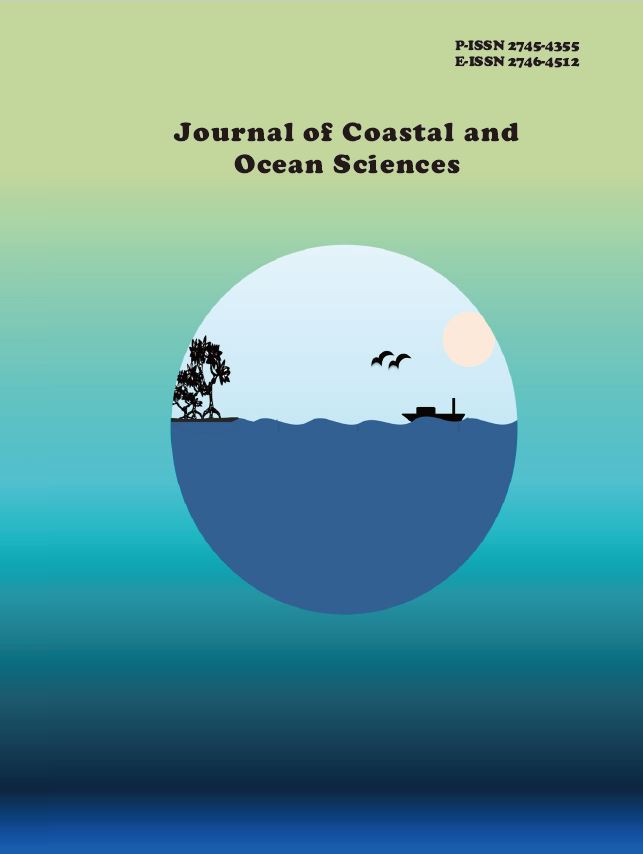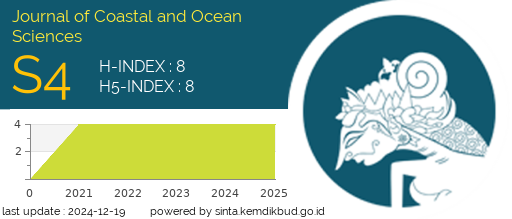The Effect of Coral Reef Ecological Changes on the Socio-Economic Community in Mapur Village
DOI:
https://doi.org/10.31258/jocos.5.3.208-214Keywords:
Impact, Economic, Mapur Island, Social, Coral ReefAbstract
The condition of coral reefs is still good on Mapur Island, which benefits community activities such as fishing and marine tourism. However, continuous activities can degrade the coral reef ecosystem, so the government has made it a Marine Conservation Area for the Eastern Region of Bintan Island. This research aims to determine the ecological condition of coral reefs on Mapur Island, the influence of the coral reef ecosystem on socio-economics, as well as the impacts felt before it was designated and after it was designated as a conservation area in Mapur Village, Marine Conservation Area in the Eastern Region of Bintan Island. The results show that increasing live coral cover and decreasing dead coral cover have shown a positive recovery trend. Establishing a coral reef ecosystem conservation area in Mapur Village has several substantial impacts. Even though most people have good knowledge and perception about the function and benefits of conservation areas, primarily as fish habitats, the main challenge still lies in access to infrastructure, which is considered inadequate. The economic impact of establishing a conservation area is not yet significant because most people do not see a substantial increase in income. However, the community feels support for their livelihoods through the sustainability of fish resources. Changes in coral cover on the socio-economic conditions of the people of Mapur Island influence the ecosystem and local communities, fisheries and marine resources, the marine tourism sector of Mapur Village, natural resource management, direct economic influence, diversification of livelihoods, education, and environmental awareness, improving infrastructure and facilities, as well as challenges and limitations.
Downloads
References
Adi, C.P., Sutono, D., Umaroh, U., & Mustasim, M. (2019). Perceptions of Fishermen Communities Against the Establishment of Conservation Areas in Pongok Island, South Bangka. Jurnal Airaha, 8(1): 8 - 15
Agbeja, Y. E., Oluyede, E., & Oyedepo, V. (2021). Socio-Economic Characteristics Assessment and Livelihood Coping Strategies of Small-Scale Fisheries in Ogun waterside Local Government Area, Nigeria. International Journal of Fisheries and Aquatic Studies, 9(2): 266–276.
Arifasihati, Y., & Kaswanto, R. L. (2016). Analysis of Land Use and Cover Changes in Ciliwung and Cisadane Watershed in Three Decades. Procedia Environmental Sciences, 3, 465–469.
Arthur, R. I. (2022). Small-Scale Fisheries and Local Food Systems: Transformations, Threats and Opportunities. Fish and Fisheries, 23(1): 109–124.
Hresc, J., Riley, E., & Harris, P. (2018). Mining Project’s Economic Impact on Local Communities, as a Social Determinant of Health: A Documentary Analysis of Environmental Impact Statements. Environmental Impact Assessment Review, 72, 64–67.
Kohler, K. E., & Gill, S. M. (2006). Coral Point Count with Excel Extensions (CPCe): A Visual Basic Program for Determining Coral and Substrate Coverage using Random Point Count Methodology. National Coral Reef Institute. Nova Southeastern University Oceanography Centre. Dania Beach, 32(1), 1259–1269.
Mohan, P. M., & Kumari, R. K. (2008). Conservation of Coral Reef Environment: Perspectives for Tropical Islands. Biodiversity and Climate Change Adaptation in Tropical Islands, 725–744.
Paing, J. N., Bussel, L. V., Gomez, R. A., & Hein, L. (2022). Ecosystem Services Through the Lens of Indigenous People in the Highlands of Cordillera Region, Northern Philippines. Elsevier BV, 308, 114597–114597.
Perdinan, P., Tjahjono, R.E.P., Infrawan, D.Y.D., Aprilia, S., Adi, R.F., Basit, R.A., … & Wijanarko, K. (2024). Translation of International Frameworks and National Policies on Climate Change, Land Degradation, and Biodiversity to Develop Integrated Risk Assessment for Watershed Management in Indonesia. Elsevier BV, 6, 1–12.
Savilaakso, S., & Guariguata, M. R. (2017). Challenges for developing Forest Stewardship Council certification for ecosystem services: How to enhance local adoption? Ecosystem Service, 28, 55–66.






